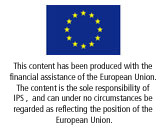By Zofeen Ebrahim
RIO DE JANEIRO, Jun 20 (TerraViva) “Rio what?” asks Saba Khan, 25, married and the mother of two young daughters, only able to catch the first part of the name of the city where the summit on sustainable development is taking place.
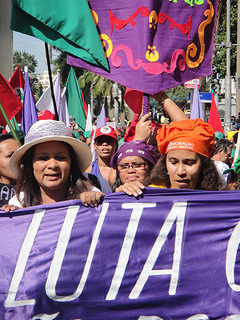
Women march through the streets of Rio on Jun. 18. The banner reads "fight" in Portuguese. Credit: Clarinha Glock/IPS
Having studied until tenth grade, Khan, who works as a housemaid in the posh Clifton area of Karachi, Pakistan, has no idea where Rio de Janeiro is or why world leaders are meeting there.
But her excitement and optimism cannot be quelled when she finds out that there will be many women participating in the Jun. 20-22 conference, women who have actually made a difference to the world.
“When women with brains get together, something great is bound to happen,” Khan says with conviction.
“They will come up with solutions for us,” she says. “A woman leader, who is also a mother, will understand how difficult it is to leave a sick child and come to work – not a man.
“In fact, half our problems can be solved if women become leaders,” she adds, and asks a little diffidently: “But will they (men) let women talk?”
Women did talk at Rio+20, but whether their voices were heard is another question.
Uzma Tahir of ActionAid-Pakistan said the original draft outcome document was neither south-friendly, nor youth-friendly.
“It’s not even women-friendly or people-centred!” she added.
Two decades ago, change was in the air. In 1991, U.S. congresswoman Bella Abzug and the Nobel laureate Wangari Maathai formed the Women’s Environment and Development Organisation (WEDO), a movement to influence Earth Summit discussions the following year.
In the world women’s congress they organised, they came up with the Women’s Action Agenda 21, a document calling for women’s rights in areas of governance, environment, land rights, food security and reproductive health. This powerful document helped get gender equality into both Rio’s Agenda 21 outcome document and the Rio Declaration.
While the days of optimism have faded for many attending the summit, even before it officially ends Friday, Suzanne Maxx, a participant who was at Rio 20 years ago and found it “an extraordinary journey” then “full of hope”, she has not given up any of her idealism.
“The hope may have diminished somewhat, as we are moving in a trajectory towards destruction, but I hold the light; that is why I am here. That is my call,” she said.
Perhaps it is time to also listen to women like Khan, who say there is something else that needs to be done – a change in men’s attitude in general.
“It’s men who deny education to their daughters or stop them from seeking a job. They have this misplaced concept of their honour getting sullied if women step out of their homes,” says Khan with exasperation.
Faced with a double burden, Pakistani women are disproportionately affected by forced joblessness, low wages if they do work, and almost no public services. At the same time, they are still expected to perform all the chores at home, where violence is part and parcel of a married life and legislation against discrimination put on the back-burner.
Indeed, Pakistan is not an easy place for anyone these days to live in, but it is particularly hard for women. But then neither is the United States, as Maxx will tell you.
“As an entrepreneur, I can tell you the capital available to men to start a business with is not available to women,” she said, adding, “It’s a global systemic problem where women are not on an equal footing when it comes to having choice to good health, equal opportunities, education or wages.”



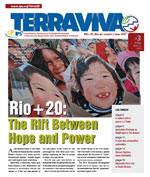
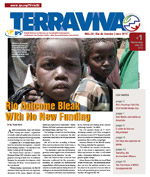
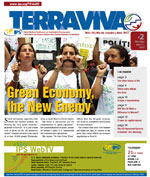

 Add to Google
Add to Google




